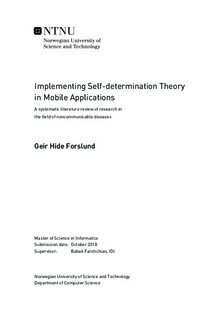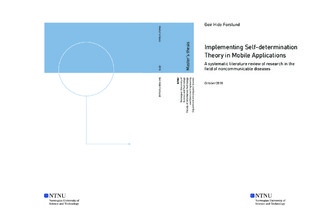| dc.description.abstract | Noncommunicable diseases are the leading cause of global deaths. Many of these deaths could be avoided if people altered some of their habits, in regards to exercise and diet. For people to make changes, their motivation has to be changed. With smartphones becoming more widespread this seems to be a great tool to help people make positive changes in their life and reduce the impact of noncommunicable diseases. Self-determination theory, a theory for explaining motivation, splits motivation into three groups amotivation, extrinsic motivation and intrinsic motivation. Intrinsic, the personal desire for doing a task being the most effective of the three. When explaining how motivation for a task can be measured, self-determination theory introduce the terms autonomy, competence and relatedness. Autonomy is the feeling of being in charge. Competence is described as the feeling of learning and progression, while relatedness is the need for belonging and being part of a group.
The research topic for the thesis is how one can use principles from self-determination theory to affect a users intrinsic motivation to make them take steps in a positive direction to change their lives and move away from habits making the contraction of noncommunicable disease more likely.
For this thesis there was conducted a systematic literature review to gather the information on the current state of affairs in the field of mobile motivational applications in relation to self-determination theory and noncommunicable diseases.
The findings of the review include a list of proposed techniques to implement in applications to help increase a users motivation by utilising the concepts of autonomy, competence and relatedness. Some of the proposed techniques are, goal-setting, motivational messaging and social networking functions. Other findings from the research are the need for customisation of the application to fit the needs of the users, and the various difficulties related to this.
Keywords: Noncommunicable diseases, self-determination theory, intrinsic motivation, autonomy, relatedness, competence, motivation, mobile application, digital health, ehealth, behaviour change. | |

